Jessybrown
Sur cette page, vous trouverez tous les documents, offres groupées et cartes mémoire flash proposés par le vendeur jessybrown.
- 2352
- 0
- 36
Community
- Abonnés
- Abbonements
2388 éléments
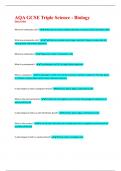
AQA GCSE Triple Science - Biology
What are eukaryotic cells? - Cells that are more complex and have a nucleus (animal and plant cells) What are prokaryotic cells? - Cells that are smaller and simpler, and don't have a nucleus but still have genetic information (bacteria) What are eukaryotes? - Organisms made of eukaryotic cells What is a prokaryote? - A prokaryotic cell (it's a single celled organism) What is cytoplasm? - A liquid gel in which most of the chemical reactions needed for life take place. It contains enzymes...
- Package deal
- Examen
- • 48 pages •
-
AQA GCSE Biology • Par jessybrown
What are eukaryotic cells? - Cells that are more complex and have a nucleus (animal and plant cells) What are prokaryotic cells? - Cells that are smaller and simpler, and don't have a nucleus but still have genetic information (bacteria) What are eukaryotes? - Organisms made of eukaryotic cells What is a prokaryote? - A prokaryotic cell (it's a single celled organism) What is cytoplasm? - A liquid gel in which most of the chemical reactions needed for life take place. It contains enzymes...
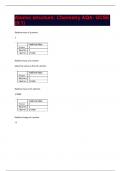
Atomic structure: Chemistry AQA: GCSE (9:1)
Relative mass of a proton 1 Relative mass of a neutron about the same as that of a proton Relative mass of an electron 1/1840 Relative charge of a proton +1 Relative charge of a neutron 0 Relative charge of an electron -1 Neutral atoms same number of positive protons as negative electrons
- Package deal
- Examen
- • 7 pages •
-
AQA GCSE Chemistry • Par jessybrown
Relative mass of a proton 1 Relative mass of a neutron about the same as that of a proton Relative mass of an electron 1/1840 Relative charge of a proton +1 Relative charge of a neutron 0 Relative charge of an electron -1 Neutral atoms same number of positive protons as negative electrons
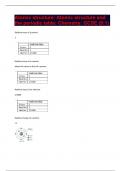
Atomic structure: Atomic structure and the periodic table: Chemstry: GCSE (9:1)
Relative mass of a proton 1 . Relative mass of a neutron about the same as that of a proton Relative mass of an electron 1/1840 Relative charge of a proton +1 Relative charge of a neutron 0 Relative charge of an electron -1 Neutral atoms same number of positive protons as negative electrons Atomic (proton) number the number of protons in the nucleus of an atom
- Package deal
- Examen
- • 6 pages •
-
AQA GCSE Chemistry • Par jessybrown
Relative mass of a proton 1 . Relative mass of a neutron about the same as that of a proton Relative mass of an electron 1/1840 Relative charge of a proton +1 Relative charge of a neutron 0 Relative charge of an electron -1 Neutral atoms same number of positive protons as negative electrons Atomic (proton) number the number of protons in the nucleus of an atom
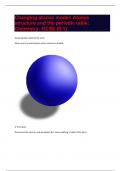
Changing atomic model: Atomic structure and the periodic table: Chemistry: GCSE (9:1)
Ancient greek model of the atom Atoms are tiny solid spheres which cannot be divided. JJ Thompson Discovered the electron and developed the "plum-pudding" model of the atom
- Package deal
- Examen
- • 7 pages •
-
AQA GCSE Chemistry • Par jessybrown
Ancient greek model of the atom Atoms are tiny solid spheres which cannot be divided. JJ Thompson Discovered the electron and developed the "plum-pudding" model of the atom
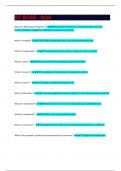
DT GCSE - AQA
What are 'Mechanical Properties'? - Properties of materials, including strength, hardness, density, durability, toughness, malleability, elasticity and ductility What is 'bending'? - The ability to withstand forces that are attempting to bend What is 'compression'? - The resistance to forces that are trying to crush or shorten What is 'shear'? - The resistance to forces sliding in opposite directions What is 'tension'? - The resistance to forces pulling in opposite directions Wha...
- Examen
- • 2 pages •
What are 'Mechanical Properties'? - Properties of materials, including strength, hardness, density, durability, toughness, malleability, elasticity and ductility What is 'bending'? - The ability to withstand forces that are attempting to bend What is 'compression'? - The resistance to forces that are trying to crush or shorten What is 'shear'? - The resistance to forces sliding in opposite directions What is 'tension'? - The resistance to forces pulling in opposite directions Wha...
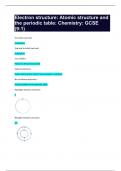
Electron structure: Atomic structure and the periodic table: Chemistry: GCSE (9:1)
First shell can hold 2 electrons 2nd and 3rd shell can hold 8 electrons no of shells = Period on the periodic table Valence electrons Outer shell electrons which are involved in reactions No of valence electrons = Group number on the periodic table Hydrogen electron structure 1 Nitrogen electron structure 2,5
- Package deal
- Examen
- • 3 pages •
-
AQA GCSE Chemistry • Par jessybrown
First shell can hold 2 electrons 2nd and 3rd shell can hold 8 electrons no of shells = Period on the periodic table Valence electrons Outer shell electrons which are involved in reactions No of valence electrons = Group number on the periodic table Hydrogen electron structure 1 Nitrogen electron structure 2,5
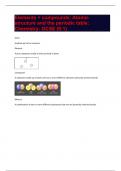
Elements + compounds: Atomic structure and the periodic table: Chemistry: GCSE (9:1)
Atom Smallest part of an element Element A pure substance made of only one kind of atom Compound A substance made up of atoms of two or more different elements joined by chemical bonds Mixture A combination of two or more different substances that are not joined by chemical bonds
- Package deal
- Examen
- • 5 pages •
-
AQA GCSE Chemistry • Par jessybrown
Atom Smallest part of an element Element A pure substance made of only one kind of atom Compound A substance made up of atoms of two or more different elements joined by chemical bonds Mixture A combination of two or more different substances that are not joined by chemical bonds
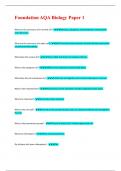
Foundation AQA Biology Paper 1
What are the structures of an animal cell? - Nucleus, cytoplasm, cell membrane, mitochondria and ribosomes. What are the structures of a plant cell? - All structures from animal cells and cell wall, permanent vacuole and chloroplasts. What does the nucleus do? - Stores DNA and directs all cellular activities. What is the cytoplasm do? - Where most chemical reactions take place. What does the cell membrane do? - Holds the cell together and controls what goes in and out. What is the mitocho...
- Package deal
- Examen
- • 15 pages •
-
AQA GCSE Biology • Par jessybrown
What are the structures of an animal cell? - Nucleus, cytoplasm, cell membrane, mitochondria and ribosomes. What are the structures of a plant cell? - All structures from animal cells and cell wall, permanent vacuole and chloroplasts. What does the nucleus do? - Stores DNA and directs all cellular activities. What is the cytoplasm do? - Where most chemical reactions take place. What does the cell membrane do? - Holds the cell together and controls what goes in and out. What is the mitocho...
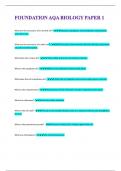
Foundation AQA Biology Paper
What are the structures of an animal cell? - Nucleus, cytoplasm, cell membrane, mitochondria and ribosomes. What are the structures of a plant cell? - All structures from animal cells and cell wall, permanent vacuole and chloroplasts. What does the nucleus do? - Stores DNA and directs all cellular activities. What is the cytoplasm do? - Where most chemical reactions take place. What does the cell membrane do? - Holds the cell together and controls what goes in and out. What is the mitocho...
- Package deal
- Examen
- • 15 pages •
-
AQA GCSE Biology • Par jessybrown
What are the structures of an animal cell? - Nucleus, cytoplasm, cell membrane, mitochondria and ribosomes. What are the structures of a plant cell? - All structures from animal cells and cell wall, permanent vacuole and chloroplasts. What does the nucleus do? - Stores DNA and directs all cellular activities. What is the cytoplasm do? - Where most chemical reactions take place. What does the cell membrane do? - Holds the cell together and controls what goes in and out. What is the mitocho...
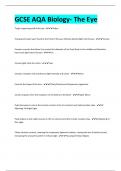
GCSE AQA Biology- The Eye
Tough supporting wall of the eye - Sclera Transparent outer layer found at the front of the eye. Refracts (bends) light into the eye - Cornea Contains muscles that allow it to control the diameter of the Pupil (hole in the middle) and therefore how much light enters the eye - Iris Focuses light onto the retina - Lens Contains receptor cells sensitive to light intensity and colour - Retina Controls the shape of the lens - Ciliary Muscles and Suspensory Ligaments Carries impulses from the r...
- Package deal
- Examen
- • 2 pages •
-
AQA GCSE Biology • Par jessybrown
Tough supporting wall of the eye - Sclera Transparent outer layer found at the front of the eye. Refracts (bends) light into the eye - Cornea Contains muscles that allow it to control the diameter of the Pupil (hole in the middle) and therefore how much light enters the eye - Iris Focuses light onto the retina - Lens Contains receptor cells sensitive to light intensity and colour - Retina Controls the shape of the lens - Ciliary Muscles and Suspensory Ligaments Carries impulses from the r...
